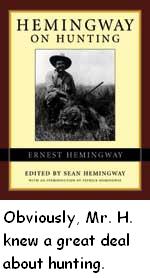Lessons from the Lion: Patterns of Courage and Cowardice
in Hemingway's "The Short Happy Life of Francis Macomber"

The scene where Francis Macomber first encounters the lion is actually narrated twice -- once, of course, from Macomber's point-of-view (para. #169) and once from the lion's point-of view (para. #168). The point by point contrast between the lion's behavior and Macomber's conduct presents the both the reader and poor Francis himself with patterns of macho courage and macho "gutlessness." In fact, it is reasonable to say that the lion's behavior actually plays a noticeable part in teaching Macomber how to cross over from cowardice to courage.
At every point in the two passages, the reader can see that Macomber is made to look inferior to the lion. The lion, for example, is described as "looking majestically and cooly toward" the Land Rover and the hunters before he moves "not afraid" towards the stream to drink. By contrast there is nothing majestic or cool about Francis' demeanor -- "his hands were shaking," and "it was almost impossible for him to make his legs move." Francis is described as being so afraid that he is trembling -- "he could feel the muscles fluttering." Francis is so terrified that he forgets at first to release the safety on his rifle; and, when he finally begins firing, he is shaking so badly that he merely wounds the lion. The wounded lion, however, is entirely focused despite his painful injuries. The lion is planning "to make a rush and get the man." Clearly in these two passages Hemingway wants the reader to respect the lion's courage and to feel something like contempt for Macomber.

It also seems worth noting another contrast between the two narrations. Francis' first shot is a "gut shot" which rips into the lion's side sending "a sudden hot scalding nausea through his stomach." Despite the excruciating pain of a belly wound, the lion carries on, determined to destroy his attacker. The cowardly Macomber also has a pain in his stomach, but it merely makes him seem like his usual wimpy self. After the wounded lion has gone into the high grass in hopes of ambushing his tormenter, "Francis stood there feeling sick at his stomach." In a word, Macomber is about to "puke" from fear. (By the way, it certainly seems likely that this emphasis on literal stomachs or "guts" is meant to comment metaphorically on "guts" in the figurative sense of courage.) In any event, it is clear that Francis' encounter with the lion showed the lion as a pattern of courage and Francis as a pattern of cowardice.
Near the end of the story, during the dangerous buffalo hunt, Macomber finally finds his courage and rejects the pattern of cowardice. Once again he has to confront a dangerous animal, but this time he is able to stand toe-to-toe with Wilson the hunter, and Wilson really notices what a different man he has become. As Wilson says to himself about the changed Macomber, "Yesterday he's scared sick and today he's a ruddy fire eater." Certainly part of what inspired the change in Macomber was the example of Wilson and part was inspired by his anger at his adulterous and bitchy wife Margaret, but some part of the change was clearly influenced by the lion's behavior. In short, the lion helps teach Francis the lesson he needs to learn.
